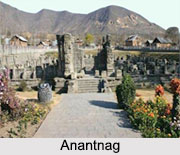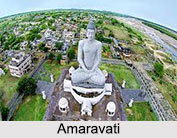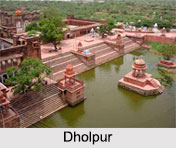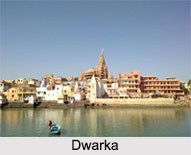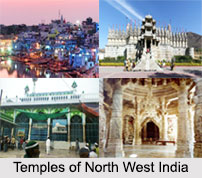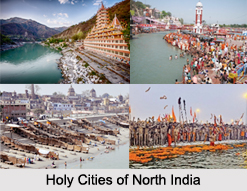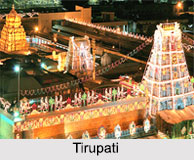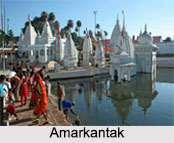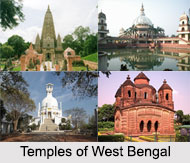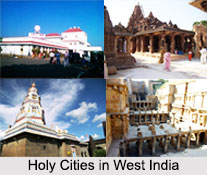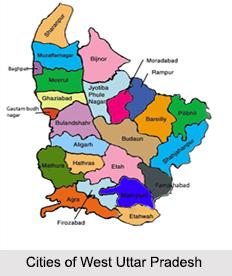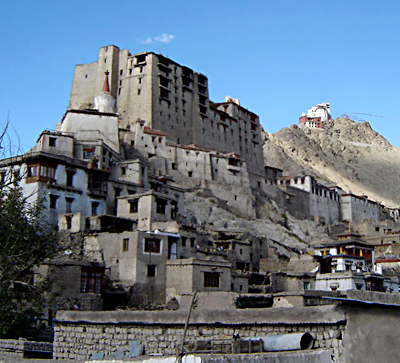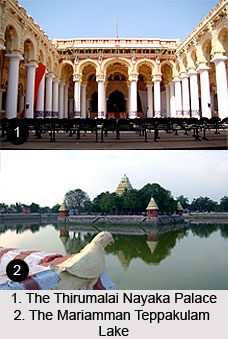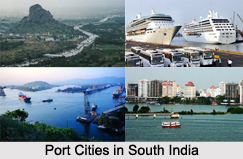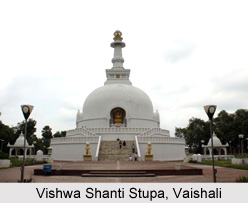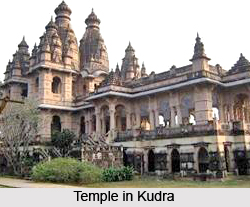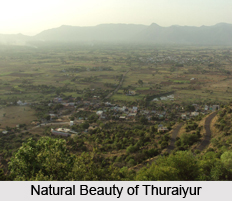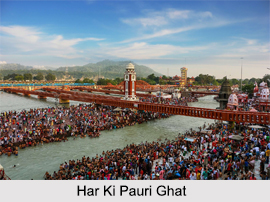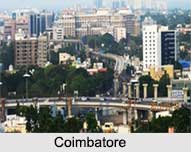 Coimbatore or Kovai is the second largest city in the state of Tamil Nadu. It is the administrative headquarters of Coimbatore District. Popularly known as "Manchester of southern India", Coimbatore is also an integral part of the Kongu Nadu region of Tamil Nadu. It is the 16th largest urban agglomeration in India.
Coimbatore or Kovai is the second largest city in the state of Tamil Nadu. It is the administrative headquarters of Coimbatore District. Popularly known as "Manchester of southern India", Coimbatore is also an integral part of the Kongu Nadu region of Tamil Nadu. It is the 16th largest urban agglomeration in India.
Location of Coimbatore
Coimbatore is a foremost city in the Indian state of Tamil Nadu. It is situated on the banks of the Noyyal River and surrounded by the Western Ghats.
Etymology of Coimbatore
Coimbatore probably got its name from a king called Kovan who ruled the area and hence was called Kovanpudur. Later the name was anglicized as Coimbatore. In modern times the name is sometimes abbreviated as CBE based on the Indian Railways station code. It is also believed that the city is named after the main deity of the town "Koniamman" - "Koniamman pudur" turned into Coimbatore.
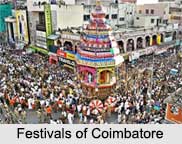 History of Coimbatore
History of Coimbatore
Coimbatore was part of Kongu Nadu throughout the Sangam period and was ruled by the Cheras as it served as the eastern doorway to the Palakkad Gap. Coimbatore was located along the ancient Roman trade route that extended from Muziris to Arikamedu in South India. The area was ruled by the Vijayanagara Empire in the 15th century followed by the Nayakas.
In the later part of the 18th century, Coimbatore came under the territory of Mysore and following the defeat of Tipu Sultan in the Anglo-Mysore Wars. The British East India Company seized Coimbatore to the Madras Presidency in 1799. The region played a major role in the Second Poligar War (1801) when it was the area of operations of Dheeran Chinnamalai.
In 1804 Coimbatore was established as a capital for the newly formed Coimbatore district and in 1848. Sir Robert Stanes, a British entrepreneur and philanthropist, became the first Chairman of the Coimbatore City Council who founded the "Stanes School" in 1862, a major higher secondary school that has stood until the present day as a jewel of the city. The region was hard hit throughout the Great Famine of 1876–78, resulting in almost 200,000 famine related fatalities. The area experienced a textile boom in the early 19th century due to the turn down of the cotton production in Mumbai. Coimbatore played a noteworthy role in the Indian independence movement with Mahatma Gandhi.
Geography of Coimbatore
Coimbatore is located in south India at 411 metres higher than the sea level on the banks of the Noyyal River. It is bordered by the Western Ghats mountain range to the West and the North, with reserve forests of the Nilgiri Biosphere Reserve on the northern side. The city is divided into two distinguishing geographic areas that is the dry eastern side and the western area. The northern part of the city has a rich humid evergreen forest.
Climate of Coimbatore
Coimbatore has a pleasant climate. The city has a tropical wet and dry climate. The maximum temperature ranges from 35.9 degree centigrade to 29.2 degree centigrade. The mean minimum temperature ranges from 24.5 degree centigrade to 19.8 degree centigrade. The highest temperature ever recorded is 40.4 degree centigrade.
Demography of Coimbatore
As per the 2011 census, Coimbatore had residents of 1,050,721 with a sex ratio of 997 females for every 1,000 males, much above the national average of 929. The average literacy of the city was 82.43 percent.
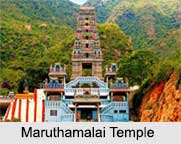
Culture of Coimbatore
Tamil is the official language and a dialect "Kongu Tamil" is predominantly spoken here. It also has a noteworthy number of Kannadigas, Telugus, Malayalis, and North Indians mainly Gujaratis. Hinduism is the major religion here with marginal Muslim and Christian population. Jains, Sikhs and Buddhists are also present in small numbers. "Mariamman" festivals are being held at Coimbatore"s several Mariamman temples in summer.
Foremost Hindu temples of Coimbatore include the "Perur Patteeswarar Temple", "Naga Sai Mandir", "Koniamman Temple", "Thandu Mariamman Temple", "Eachanari Vinayagar Temple", "Marudamalai Murugan Temple", "Ashtamsa Varadha Anjaneyar Temple" and the 112-foot "Adiyogi Shiva statue" which is the world`s tallest bust of Lord Shiva. The food culture of Coimbatore is mainly south Indian with rice. Eating on a banana leaf is an old custom. "Arisi Paruppu Sadam" is a recipe that survived from 4th century AD and exclusive of Coimbatore. "Kaalaan" is another popular dish of Coimbatore. "Mysorepa" is a sweet made from lentil flour and ghee and is loved by the residents. Idly, dosa, halwa, vada-sambar and biryani are popular dishes of Coimbatore.
Art, dance and music concerts are held yearly throughout the months of September and December. It also has a number of museums and art galleries like G.D. Naidu Museum and Industrial Exhibition, H. A. Gass Forest Museum, Government Museum, Kadhi Gandhi Gallery and Kasthuri Srinivasan Art Gallery and Textile Museum.
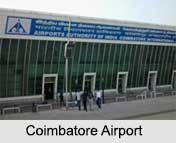
Economy of Coimbatore
Coimbatore`s primary industries are engineering and textiles. India`s largest amount of hosiery and poultry industries are also present here. Entrepreneurs run most of the industries, often indigenous with family based or community financing. Coimbatore has trade organizations such as Coimbatore District Small Industries Association representing the industries in the city. It also houses a number of textile mills and is the base of textile research institutes like the Sardar Vallabhbhai Patel International School of Textiles and Management, Central Institute for Cotton Research (CICR) and the South India Textile Research Institute (SITRA). Kovai Cora Cotton saree is a known as Geographical Indication.
Administration of Coimbatore
Coimbatore is a Municipal conglomerate, administered by the Coimbatore Municipal Corporation and is the administrative headquarters of Coimbatore district. The city is divided into five organizational zones – East, West, North, South and Central, each further subdivided into 20 wards. A big part of Coimbatore falls outer the Municipal Corporation limits. Coimbatore selects ten members to the Tamil Nadu Legislative Assembly and one member to the Indian Parliament.
Education of Coimbatore
Coimbatore is a foremost educational centre. The first engineering college in the city, the Arthur Hope College of Technology which is now known as the Government College of Technology was started by G.D. Naidu in 1945 followed afterwards by personal engineering colleges PSG College of Technology and Coimbatore Institute of Technology in the 1950s.
The Air Force Administrative College is the oldest training institute of the Indian Air Force. Other educational institutions of Coimbatore are as follows:
•Coimbatore Medical College
•Government Law College
•Salim Ali Centre for Ornithology and Natural History
•Tamil Nadu Agricultural University
•Anna University Coimbatore
•Bharathiar University
•Central Institute for Cotton Research
•Sugarcane Breeding Research Institute
•Institute of Forest Genetics and Tree Breeding
•Indian Council of Forestry Research and Education
Things To Do in Coimbatore
Coimbatore also has a number of tourist attractions like Karaimadai Ranganathar Temple, Aliyar Dam Reservoir Park, Gass Forest Museum, Bethesda International Prayer Centre, Vaidehi Waterfall, Kovai Kondattam, Vellingiri Hill Temple, Kovai Kutralam falls, Siruvani falls and dam, Monkey falls and so on.
Visiting Information of Coimbatore
Coimbatore is served by the Coimbatore International Airport situated at Peelamedu. The major railway station is the Coimbatore Junction and Coimbatore lies on the Coimbatore - Shoranur broad gauge railway line. Coimbatore bypass is a series of bypasses connecting the various national highways and state highways. Discover local businesses including manufacturers, suppliers, and dealers across industries in Coimbatore Yellowpages.
